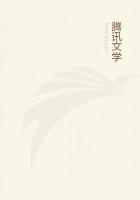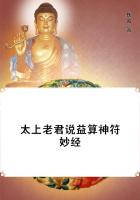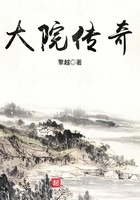The three women—for Gervaise had joined Mahiette and Oudarde—looked through the window,and though their heads intercepted the feeble light of the cell,its miserable tenant seemed unaware of their scrutiny.
'Let us not disturb her,'whispered Oudarde;'she is in one of her ecstasies,she is praying.'
Meanwhile Mahiette gazed in ever-increasing earnestness upon that wan and withered face and that dishevelled head,and her eyes filled with tears.'That would indeed be strange!'she murmured.
She pushed her head through the cross-bars of the window,and succeeded in obtaining a glimpse into that corner of the cell upon which the unfortunate woman's eyes were immovably fixed.When she withdrew her head,her face was bathed in tears.
'What do you call that woman?'she asked of Oudarde.
'We call her Sister Gudule,'was the reply.
'And I,'said Mahiette,'I call her Paquette la Chantefleurie!'
Then,with her finger on her lips,she signed to the amazed Oudarde to look through the bars of the window in her turn.Oudarde did so,and saw in that corner,upon which the eye of the recluse was fixed in gloomy trance,a little shoe of rose-coloured satin covered with gold and silver spangles.Gervaise took her turn after Oudarde,after which the three women gazing upon the unhappy mother mingled their tears of distress and compassion.
But neither their scrutiny nor their weeping had stirred the recluse.Her hands remained tightly locked,her lips silent,her eyes fixed,and to any one who knew her story that little shoe thus gazed at was a heart-breaking sight.
None of the three women had uttered a word;they dared not speak,not even in a whisper.This deep silence,this profound grief,this abstraction,in which all things were forgotten save that one,affected them like the sight of the High Altar at Easter or at Christmastide.A sense of being in some holy place came upon them;they were ready to fall on their knees.
At length Gervaise,the most inquiring of the three,and therefore the least sensitive,endeavoured to get speech of the recluse.'Sister Gudule!Sister!'she called repeatedly,raising her voice louder each time.
The recluse never stirred.Not a word,not a glance,not a breath,not a sign of life.
Oudarde,in a softer and more caressing tone,tried in her turn.'Sister!'she called;'Sister Gudule!'
The same silence,the same immobility.
'A strange woman indeed!'cried Gervaise;'no bombard would make her move.'
'Perhaps she is deaf,'suggested Oudarde.
'Or blind,'added Gervaise.
'Perhaps she is dead,'said Mahiette.In truth,if the soul had not actually quitted that inert,motionless,lethargic body,at least it had withdrawn itself to such inaccessible depths that the perceptions of the external organs were powerless to reach it.
'There remains nothing for us to do,then,'said Oudarde,'but to leave the cake on the ledge of the window.But then,some boy will be sure to take it away.What can we do to arouse her?'
Eustache,whose attention up till now had been distracted by the passing of a little cart drawn by a great dog,now noticed that his three companions were looking at something through the window above him,and,seized in his turn with curiosity,he mounted upon a stone,stood on tip-toe,and stretched up his round,rosy face to the hole,crying,'Mother,let me see too!'
At the sound of the child's clear,fresh,ringing voice the recluse started violently.She turned her head with the sharp and sudden motion of a steel spring,the two long,fleshless hands drew aside the veil of hair from her brow,and she fixed upon the child a pair of bewildered and despairing eyes.
It was but a glance.'Oh,my God!'she cried,suddenly burying her face in her knees,and it seemed as if her hoarse voice tore her breast in passing,'in pity do not Show me those of others!'
'Good-morrow,dame,'said the child soberly.
The shock had awakened the recluse from her trance.A long shiver ran through her from head to foot,her teeth chattered,she half raised her head,and pressing her arms to her sides,she took her feet in her hands as if to warm them.
'Oh,the bitter cold!'she murmured.
'Poor soul!'said Oudarde in deepest pity,'will you have a little fire?'
She shook her head in token of refusal.
'Then,'Oudarde went on,holding out a flask to her,'here is hippocras;that will warm you--drink.'
She shook her head again and looked fixedly at Oudarde.'Water,'she said.
'No,sister,'Oudarde insisted,'that is no drink for a January day.You must have a little hippocras,and eat this wheaten cake we have baked for you.'
She pushed away the cake Mahiette held out to her,and said,'Some black bread.'
'Come,'said Gervaise,seized with charity in her turn,and taking off her woollen cloak,'here is a cloak something warmer than yours.Put it round your shoulders.'
But she refused this as she had done the flask and the cake.'A sack,'she answered.
'But you must have something to show that yesterday was a holiday!'urged the good Oudarde.
'I know it well,'answered the recluse;'these two days I have had no water in my pitcher.'
After a moment's silence she continued,'It is a holiday,so they forget me.They do well.Why should the world think of me,who think not of it?Cold ashes to a dead brand!'
And as if exhausted by having said thus much,she let her head fall again upon her knees.The ******-minded,compassionate Oudarde gathering from these last words that the poor woman was still lamenting at the cold,said once more:
'Then will you not have some fire?'
'Fire!'answered the woman in a strange tone,'and will you make a fire for the poor little one that has been under the ground these fifteen years?'
She trembled in every limb,her voice shook,her eyes gleamed,she had risen to her knees.Suddenly she stretched out a thin and bloodless hand and pointed to the child,who gazed at her round-eyed and wondering.'Take away that child,'she cried,'the Egyptian is coming by!'















